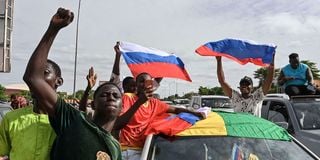The signs the world missed on Niger coup

Supporters of the junta wave Russian flags as they demonstrate in Niger’s capital Niamey on August 6. The root driver of Niger’s problems is a changing global climate regime.
Niger is not a rich country, going by the wealth of its people. But it has Uranium, which has powered French nuclear plants for years.
This paradox may have been clearer in the wake of the July 26 coup in which the army deposed President Mohamed Bazoum.
But something else is happening: Thousands of coup supporter have poured into streets, waving Russian flags.
Protesters also waved Russian flags in Mali, Guinea and Burkina Faso after military coups there.
They chanted in Niamey too: “Down with France, long live Putin, long live Russia.”
The supporters of the junta were clear in their denunciation of former colonial power France.
Within days, the Wagner Paramilitary Company Group, widely viewed as a form of Russian influence in Africa, was speaking to the coup leaders.
Wagner is a sanctioned organisation in the West for alleged involvement in rights violations.
Bazoum’s government was heavily supported by Washington. After the coup, the US declared it would pause certain assistance to the country.
A CIA assessment had showed that this Sahel state was a linchpin in preventing the spread of religious violent extremists in the region, along with acting as a counter to Russia’s growing influence.
Wagner operates in the region and Russian leader Vladimir Putin has made it known that he would like to expand his country’s influence in the Sahel, even though he had a spat with Wagner back home recently.
Niger is a near-perfect case-study of a vulnerable African state, exposed to persistent instability and to external influences.
In rejecting their former colonial masters, citizens may have found a scapegoat for their unhappiness.
Niger is a vital player in the global uranium market. That may be a reason behind Wagner’s interest in playing a role in the post-coup control of the reserves.
Despite contributing five percent of global uranium exports last year, Niger’s output is desirable because of the purity and extent of its reserves.
The possible switch of geopolitical sides that followed the coup is far more important than the country itself would seem to command.
Niger is the largest country in West Africa. As a counter-terrorism partner against regional violent extremist organisations, Niger plays an important role in the dealings of Washington and Paris.
Niger is last among 189 countries in the 2021 UN Human Development Index. It has the fastest population growth rate in the world. These facts amount to a formula for instability.
In addition, more than half the estimated 25.4 million people in Niger are under 15, the literacy rate is below 30 per cent while joblessness is unmeasurable. Niger is considered at risk to extremist Islamic ideology.
The root driver of Niger’s problems is a changing global climate regime. The effects of that in this exposed country is set against rapid expansion of demand from a growing population for diminishing resources of water and arable land.
Over several years prior to the coup, Niger’s elected government had been closely working with the US, under the banner of ‘Mission Niger’, on issues of “development, democracy, and defence”.
These areas of engagement were seen as “strategic axes”, reported the US State Department in 2022, to help the country “strengthen its democracy and human rights, with increasingly accountable governance; become an increasingly capable partner against regional threats; and advance inclusive and sustainable economic growth”.
Clearly, “Mission Niger” has failed – or is on hold while the junta remains in charge.
The US proclaimed “concerted diplomatic engagement, broad and well-targeted development assistance, and a commitment to work with Niger to help it overcome challenges from regional insecurity, poor governance, inadequate provision of health care and education, steadily increasing desertification, food insecurity, and rapid population growth.” But that was not enough to head off the coup.
It is clear that what was previously thought of as an extended multi-decade drought, causing dislocation and conflicts, was actually an early manifestation of climate change in Africa. Niger is rapidly becoming desert.
According to the Food and Agricultural Organisation, Niger has struggled with desertification, land degradation, drought and loss of biodiversity for years, together combining to put it into the category of states with persistent food crises.
The World Bank says Niger losses 100,000 hectares to desertification every year.
With the central government having little reach beyond the limits of the capital, Niger is vulnerable to insurgency and intrusions of non-state players.
But Niger is also financial insecure, being one of the world’s heavily indebted poor countries, according to the Word Bank and the International Monetary Fund. The economy is tiny and fragile – and control of its key and primary raw commodity, uranium, is central to who controls Niger. Agriculture is mainly subsistence.
According to a recent CIA report, Niger also produces coal, iron ore, tin, phosphates, gold, molybdenum, gypsum, salt and petroleum – though none in significant measure.
Multiple ethnic groupings, plus contestation between “Black” and “Arab-like” Africans, are the final pieces of a complex mix.
Dr Scott Romaniuk, an Newton Fellow at the University of South Wales, and Prof János Besenyő, the head of the Africa Research Institute of Óbuda University in Hungary, argue that under a fragile junta, Niger could become a breeding ground for extremist activities.
“This may occur due to involvement by Western powers with neo-colonialist motives or, conversely, in the absence of Western troops,” they say.





